They Are Different
Roy Tan’s ears would prick up only twice in his life: once for love and once for history.
Tan, 65, first noticed his attraction to men in the changing room at the Royal Selangor Golf Club in Kuala Lumpur, Malaysia. He was five years old at the time, and his parents would often take him there to accompany them to the swimming pool. Tan—who hoards clothes and books, but information the best—remembers the men there. The shapes of their bodies. The way their muscles dipped and curved in ways that were yet to draw breath on his own prepubescent form.
He was fascinated by them. And it is only in hindsight that he realizes he was awakened by them, too.
It wasn’t until Tan hit puberty, and began to enter heterosexual relationships, that he noticed he did not feel the same attraction to the opposite sex. Tan’s relationships with his girlfriends paled in comparison to the attachments he had with his best friends.
Beginning in primary school, Tan had a string of intimate relationships with male classmates whom he referred to as his best friends. They would experiment with each other’s bodies and forge connections that were far deeper than the ones he would have with his girlfriends.
But there always seemed to be an hourglass flipping over on the horizon of each of these friendships, and when it came time for everyone to leave for university, Tan had nobody. Worse, he had nowhere to go. “I felt really lonely at that time,” he recalled. “I thought I was the only homosexual that could accept themselves in Singapore.”
There was no internet yet. No website or database where he could find other members of the gay community in Singapore. There was scarcely a trace of homosexual life in newspapers until 1972 when the New Nation, an evening newspaper at the time, published a groundbreaking series of articles titled “THEY ARE DIFFERENT…” on the LGBTQ+ community in Singapore.
A major discovery is that there are more gay people in Singapore than we realized. Friends, acquaintances, public figures, teachers, lawyers, admen, clerks, blue-collar workers, students, artists, secret society toughs, waiters, people not normally suspected of being inclined in this way are among those we found to be gay.
Although the feature was published on four consecutive days and relied on months of investigative reporting, the names of the cruising venues frequented by its subjects were omitted. A strange sensation swept over Tan that last week of July. Here he was, with evidence that another world existed in the country where homosexuality was still considered a crime.
And he had no knowledge of how to get there.
It was only several years later when an article published in The Straits Times caught Tan’s eye. The article detailed a complaint against young boys holding hands in Hong Lim Park. “I met my first boyfriend ever in the gay community at the foot of a now-demolished shopping center on the fringe of Hong Lim Park,” Tan says.
He was the one who introduced Tan to the world he had only read about before. They went to every gay venue together, one by one. It was then that Tan started to create a map. A trail of every newspaper clipping he could find. The court cases that were tried under anti-LGBTQ+ colonial legislation, milestones along the way, and all the notable figures under which he himself would soon fall under. This half-timeline, half-encyclopedia would soon be digitized and deemed the most comprehensive account of Singapore’s LGBTQ+ community ever created.
The Singapore LGBT Encyclopedia Wiki was born out of Tan’s efforts to, as it says, “integrate all the disparate sources of information on Singapore’s LGBT community into one convenient site.” As of May 2023, there are over 3,880 pages of LGBT-related content such as “Bugis Street: transgender aspects,” “Singapore gay censorship,” and “Rascals incident (Singapore’s Stonewall).”
Tan would go on to organize Singapore’s first pride parade in Hong Lim Park in 2008—Speakers’ Corner remains the only outdoor area in Singapore where citizens are allowed to hold public speeches, performances, and exhibitions without a license—and march in the first, and only, LGBTQ+ contingent in the Chingay Parade in 2010.
That year, the People’s Association revoked the rule that participants needed to be vetted before marching in the annual Chingay Parade. Tan’s ears pricked up again.
He knew he only had one chance to do something revolutionary. And so Tan and fellow Singaporean citizen Tien Kim Chuan, dressed in pink sequined shirts and feather boas, hoisted a large rainbow flag up in the air and walked right past Prime Minister Lee Hsien Loong.
“He said, ‘Look at those two strutting their stuff,’” Tan muses. “It was an exhilarating experience for me.” Currently, 13 years after Tan’s march, there remains a ban on groups parading without prior vetting and approval.
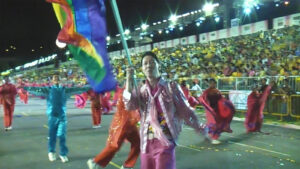
Tan admits that he will probably never be finished uploading to the site all the information that he has amassed over his lifetime, most of which was directly witnessed by him. “The history of the LGBT community in Singapore runs parallel to the history of my own life,” he explains. “It was my life story and how I discovered my true self and people like me.”
Tan retired from a career as a doctor in 2018 and after a lifetime of LGBTQ+ activism work, the then-61-year-old decided to set his sights on something bigger: the repeal of Section 377A.
A Slippery Road…
Section 377A of the Singapore Penal Code is a colonial-era law that states
Any male person who, in public or private, commits, or abets the commission of, or procures or attempts to procure the commission by any male person of, any act of gross indecency with another male person, shall be punished with imprisonment for a term which may extend to two years.
Section 377A was introduced in Singapore during British colonial rule in 1938, and despite numerous attempts at challenging its place in the constitution by LGBTQ+ rights activists as well as Prime Minister Lee declaring that the law was not “proactively enforce[d]” in 2007, Section 377A was not officially repealed until December 2022.
Tan had wanted to challenge Section 377A since the 1990s when the Singapore police grew increasingly violent and persistent in cracking down on gay men and utilizing Section 377A to charge them in court. But it wasn’t until 2010 when he attended a meeting hosted in a pub along Boat Quay by human rights lawyer Ravi Madasamy that Tan knew he had a case.
The attorney, better known as M. Ravi, told the crowd of longtime LGBTQ+ rights activists that he wanted to challenge Section 377A on behalf of his friend Tan Eng Hong who had been prosecuted earlier that year for having oral sex in a locked cubicle of a public restroom at CityLink Mall.
“Most of the activists wanted to turn away. They were completely unsupportive of Ravi,” Roy Tan recalled. “They said if you want to challenge Section 377A in court, you shouldn’t do it with a toilet sex case, but… I was thoroughly convinced.”
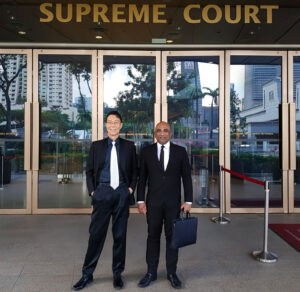
Although Tan Eng Hong’s case eventually got dismissed, this “toilet sex case” became instrumental in paving the way for subsequent constitutional challenges against Section 377A by highlighting the contradictions that existed within the legal system.
In 2019, Ravi and Roy Tan launched another constitutional challenge against Section 377A. Fueled by India’s decriminalization of gay sex in 2018 and what Tan described as “novel arguments,” their new case focused on the incongruities that existed between the Criminal Procedure Code and the Penal Code.
“[The law] subjects gay men to the potential distress of an investigation into private conduct where they have a legitimate expectation that the state will decline to prosecute,” Tan said in a statement to the press at the time. “It represents not only a contradiction between the Public Prosecutor’s prosecutorial discretion and the non-discretionary carriage of criminal justice on the ground but is also a restriction on their personal liberty.”
The High Court pronounced Section 377A unenforceable in its entirety. On August 21, 2022, Prime Minister Lee announced during a National Day Rally speech that Section 377A would be repealed.
“Nobody saw it coming except Ravi,” Tan remarks. “We owe a lot to Ravi.”The general public was divided over news of its impending repeal, with proponents of the repeal arguing for “liberty” and “equality” and opponents cautioning against the supposedly Western ideology and its “homosexual agenda.”
Singapore’s Stonewall
Isaac Tng’s LGBTQ+ walking history tour starts near the Elgin Bridge along the Singapore River, where immigrants from all over the world once arrived on its banks. It makes a stop at the former site of Singapore’s first gay sauna, and it passes through Hong Lim Park—to commemorate the words Tan shouted into the megaphone all those years ago.
Tng, 34, developed the idea of leading Singapore’s first LGBTQ+ walking history tour when he was on a bar crawl in Tokyo, Japan. Tng, who is one of the founders of Pridecommunity, an LGBTQ+ pride organization dedicated to transcending boundaries within the queer community, wanted to educate Singaporeans about their own country’s queer history by taking them around the island to explore historically LGBTQ+ sites.
“There’s this misconception that queerness comes from the Americans and Europeans, that out of nowhere, maybe in the 1950s or ‘60s, sprouted out this movement brought about by Westerners and this whole gay culture started in Singapore,” Tng explains. “That’s not how it happened.”
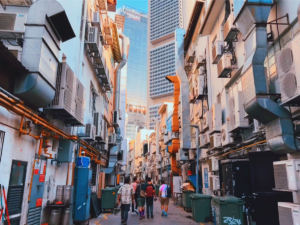
Tng attributes part of the spread of this misconception to a lack of access that people have to information about Singapore’s LGBTQ+ history. He points to the “very curated” national education in local Singaporean schools as well as the largely unwritten or hidden queer history in textbooks. The most common question that he receives on these walking history tours is how queerness came to Singapore when in actuality, “Singapore is one of the places where LGBTQ+ movements and queerness started in Southeast Asia.”
Sida Chu, 20, remembers gazing up at the figure of Guan Yin when she was younger. Chu, a Permanent Resident of Singapore and a current undergraduate student at Wesleyan University, has been well-acquainted with the Buddhist bodhisattva for years.
Bodhisattvas are enlightened beings who delay achieving nirvana in order to dedicate their lives to eradicating the suffering of all. Guan Yin is one of the most well-known bodhisattvas, transcending gender identification and taking on any form necessary to assist those in need. She or he is characterized as a person with the power to look as either a man or a woman, or as a mythical being who was once a male but is now a woman.
They are how Chu is certain that she, too, is a woman.
Evidence of queerness is not only prevalent in Chinese culture but in indigenous Malay and Hindu cultures as well, with each ethnic group engaging in fluid explorations of gender and sexuality. Singapore is home to an inherent cultural diversity due to the country’s status as a migrant state. Comprised mostly of Chinese, Indian, Malay, Eurasian, and Peranakan communities, it may be the most religiously diverse country in the world.
“[Queerness is] very prominent in Asian cultures and we should take ownership of it,” Chu asserts.
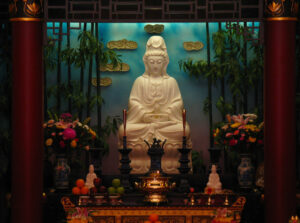
The LGBTQ+ walking history tour leads its participants chronologically from the 1800s to today. It’s presented as a modern retelling of history, interwoven with personal stories. It informs Singaporeans about the different prejudices and challenges that the LGBTQ+ community had to face over time.
Tng says that people of all ages, genders, sexual orientations, and races take his walking history tour and that it always manages to astonish him when an older member of the tour group shares their own encounters with the darker sides of Singapore’s LGBTQ+ history. “You realize there was a lot more that happened than what was published in the papers,” he says. People who lived through two major LGBTQ+ events that occurred in 1993—the Rascals Incident and the Tanjong Rhu Entrapment Exercise—have been among those toured by Tng.
The Rascals Incident, which has been referred to as Singapore’s Stonewall, occurred on May 30, 1993, when the police raided the Rascals nightclub on a Sunday, which was known as gay night. Many club patrons were interrogated and those that did not have their National Registration Identity Card (NRIC) were subsequently detained. It was later revealed that these police officers had no legal right to detain anyone without an NRIC, and their acting commander issued an apology.
Tanjong Rhu was a popular gay cruising spot in Singapore and throughout the 1990s, it was the scene of multiple police entrapments targeting the homosexual community. Police officers would pose as cruisers in order to lure gay men into making physical contact. Once physical contact was made, these officers would charge the men with “outraging their victim’s modesty.” Sometimes, it was the officers themselves who made the propositions. In November 1993, a police entrapment exercise led to the arrest and caning of 12 men, and jail sentences ranging from two to six months.
“It always surprises me,” Tng says. “How they chose not to crumble under this kind of prejudice.”
Tng had his own encounters with prejudice and bigotry while training to get his license as a tour guide. He recounted instances where his classmates would make homophobic comments about the queer community to a point Tng describes as “ridiculous.” However, these remarks simply served to motivate him further, making all subsequent acts of compassion all the more sincere.
He remembers when a mother and her 12-year-old daughter came on the walking tour together. “Parents have been known to dismiss [their child’s] sexuality,” he says. “They say it’s just a phase.”
But the mother in this instance brought her daughter on the tour with the intention of letting her “explore herself and come to understand” her queerness. Having been raised in a conservative Chinese background, this was an act that deeply moved Tng.
…of No Return
The repeal of Section 377A was first announced on August 21, 2022, during a National Day Rally speech, with Prime Minister Lee stating that it was the “right thing to do.” He declared, “This will bring the law into line with current social mores, and I hope, provide some relief to gay Singaporeans.”
Yet, as Prime Minister Lee was announcing the news on live television, he made a vow to religious conservatives to “uphold and safeguard the institution of marriage” as it is traditionally defined between a man and a woman.
This addendum may have stemmed from the “Protect Singapore Townhall — Safeguarding Our Future” event that was held a few weeks before the repeal of 377A, during which the majority religious audience argued against the repeal and called for stricter language in the constitution to preserve heterosexual marriages. This event, which garnered over 1200 attendees, featured an interfaith panel dedicated “to protect[ing] the traditional definition of marriage and family.
Event organizers Jason Wong, a former board member and chairman of the Christian organization Focus on the Family, and Mohamed Khair Mohamed Noor, the executive chairman of a Muslim marriage preparation course program called the SuChi Success Initiatives, posted summaries of their meeting on Facebook. They wrote: “We urge the Government to maintain the current political package and not to repeal Section 377A unless and until there are adequate safeguards for our marriages, families, and freedom of conscience… This includes enshrining man-woman marriage in the Constitution.”
The Roman Catholic Archdiocese of Singapore expressed agreement with the call for a traditional definition of marriage, releasing a statement that warned against the repeal of 377A without such a safeguard. “Otherwise, we will be taking a slippery road of no return, weakening the fabric of a strong society which is founded on the bedrock of holistic families and marriages,” it read.
Shanmugam Kasiviswanathan, better known as K. Shanmugam, Singapore’s Minister for Home Affairs and Law, commented in parliament in November 2022 that the government “will try and maintain a balance… to uphold a stable society with traditional, heterosexual family values, but with space for homosexuals to live their lives and contribute to society.”
This cautious act of balancing polar opposite sides of Singaporean society, and being overtly careful not to favor one group over another, stretches far beyond the government’s treatment of the LGBTQ+ community.
Rhys Ting, 33, a member of IndigNation, Singapore’s “month-long festival of queer activism and culture,” cites a similar rationale behind the country’s attitudes towards prostitution, gambling, and chewing gum—all of which are strictly outlined by laws that are largely unenforced.
The reason behind this balancing act, Ting claims, is money.
“From the government’s point of view, they know that having a queer community is good for business. It’s good for investments. And that’s why you have companies like Facebook and Google and TikTok having their Asia-Pacific headquarters in Singapore.” He continues, “The flip side is that the government has to weigh the vested interests of the religious community.”
In his seminal book from 2002, The Rise of the Creative Class, American sociologist Richard Florida argues that greater economic development can be seen in metropolitan areas with high concentrations of “high bohemians,” artists, musicians, lesbians, and gay men. “It means businesses will treat that country as if it’s progressive,” Ting explains. “So the [Singapore] government knows they can’t kick out queer people.”
Despite the power of the pink dollar, the government makes sure to keep an eye on what the LGBTQ+ community in Singapore has to say, with Ting mentioning that “the government usually sends spies from the Internal Security Act” to attend IndigNation’s public panels addressing the rights and concerns of queer people. “There will be plain-clothed civil servants sitting in the audience looking completely out of place,” he says. “It contributes to people not feeling safe in these physical spaces.”
Ting has been a part of IndigNation’s core team since 2018. IndigNation began in 2005 as a response to the government’s ban on “Nation parties.” Nation parties, playfully dubbed Singapore’s “coming out” parties, were organized annually by LGBTQ+ web portal Fridae from 2001 to 2004 on the eve of August 8 to coincide with the country’s National Day.
These LGBTQ+ Nation parties grew from attracting 1500 attendees in its first year to over 8000 people in its last, 40% of whom were international visitors traveling to Singapore from countries such as Australia, Hong Kong, Thailand, Japan, and the United States, with the sole purpose of attending these festivities.
Even though Nation parties generated up to 6 million SGD in tourist revenue, they were soon banned from being held in Singapore, with officials citing the transmission of HIV and the country’s significant conservative population as reasons for its termination.
“The government was just concerned that it was destroying family values,” Ting said.
In December 2004, the licensing division of the Singapore Police sent a rejection letter in response to Fridae’s application to host its next Nation party, calling the festival “contrary to public interest” and “against the moral values of a large majority of Singaporeans.” Prime Minister Lee affirmed that the decision reflected “balance and judgement.”
Ting explains that IndigNation was born out of this ban and its main goal has always been to create a safe space for members of the queer community to congregate and gather together. In addition to the annual pride season held every August, IndigNation hosts public panels, workshops, and discussions like their “Beyond Repeal” conference in March 2023, featuring talks from prominent LGBTQ+ rights activists.
The scope of LGBTQ+ rights activism in Singapore is a major point of contention among queer activist groups in recent years. Smaller, more targeted LGBTQ+ rights activist groups criticize bigger groups for not being inclusive to all members of the LGBTQ+ community, while well-established pride groups such as Pink Dot SG work to appeal to the masses and people outside of the queer community.
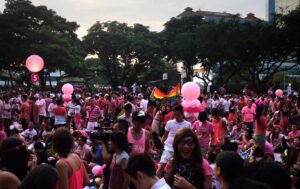
Pink Dot SG, also known simply as Pink Dot, is the host of Singapore’s biggest annual LGBTQ+ event and characterizes itself as “a group for everyone, straight and gay, who support the belief that everyone deserves the freedom to love.” Because of their aim toward broad appeal, Pink Dot has been accused by LGBTQ+ rights activists and queer Singaporeans of neglecting more pertinent issues relating to the community. (Pink Dot SG declined to be interviewed for this article.)
“Personally, I think Pink Dot is more for straight allies and there is a lot of corporate sponsorship,” Ting says. “It’s not necessarily for the queer community.”
Critics of Pink Dot have expressed particular disapproval of its failure to sufficiently represent the transgender community in Singapore.
The Earth Will Cook Us Alive Faster
Note: asterisk indicates name and age change for safety.
Mei Li*, 19, looks out of place in the bedroom where she has lived since childhood. The walls, once adorned with glossy posters from her favorite independent films, have now been painted white. The name of this hue—Winter Mood—assumes a paradoxical role in the land of the eternal summer, but nevertheless performs its duty of erasing the vestiges of the girl who once lived there.
A lone suitcase stands in the corner of the room, its handle extended and ready to be led off to a different fate. Tonight is the last day of a past life. In a few hours, Li will leave for university and never set foot in this house again.
Li began questioning her gender identity and sexuality when she was 11 years old. She was enrolled at a local Singaporean school at the time, and virtually stopped attending class when she grew more certain that she could not adhere to the heteronormative codes that guided most of her teachers and peers.
The local school system in Singapore has received criticism over the years for “suppressing, erasing, and bullying” members of the LGBTQ+ community. As recently as last summer, presentation slides from a sex education assembly at Hwa Chong Institution surfaced online for anti-LGBTQ+ claims such as “58% of homosexuals have problems with intestinal worms” and “one in 15 homosexuals is a pedophile.”
More serious accusations of an anti-LGBTQ+ agenda alleged the Ministry of Education’s (MOE) interference with and blocking of students undergoing hormone replacement therapy. In January 2021, a student under the name of “Ashlee” detailed in a viral Reddit post how she was “threatened with expulsion should any physiological changes take place that prevent her from wearing the uniform for boys.” The school reportedly also asked for her hair to be cut.
Ashlee’s allegations sparked public outrage, with hundreds of teachers, psychologists, counselors, and social workers signing an online petition demanding the implementation of trans-friendly policies. An unpermitted protest ensued outside the MOE building, with demonstrators holding signs that read “#FixSchoolsNotStudents” and “Trans students will not be erased.” A few of them were arrested within half an hour.
The MOE has denied these claims, writing in a 2021 Facebook post: “We are not in a position to interfere with any medical treatment, which is a matter for the family to decide on.” Despite this, it has grown progressively difficult for transgender individuals in Singapore to obtain access to gender-affirming health care.
Li wanted to undergo hormone replacement therapy when she was 18 years old. And even though she met the minimum age requirement to start HRT, Singaporean law dictates that anyone under 21 that wishes to start HRT must secure consent from both parents—something that Li did not have.
“In Singapore, you basically don’t have any rights to your body until you are 21,” Li says. Parental consent is not only needed for gender-affirming health care but also for undergoing urgent medical procedures such as computerized tomography (CT) scans as well.
But that didn’t stop her.
Li began to find other, illicit means of procuring hormone pills. She recalls asking around on anonymous forums online and perusing unofficial websites that advertised hormone pills for a third of their market price. Eventually, Li was able to get the pills “from a friend of a friend whose neighbor used to work in a pharmacy overseas,” but many transgender teens who are unable to safely undergo HRT are forced to consume these black market products.
“[Black market] pills are usually safe if you know where to get them from and you check the packaging,” Li says. “It’s black market injectable estrogen that’s really unsafe.” Based on a 2018 study published in the National Library of Medicine, “Provider experience suggests that black market injectable estrogen is often diluted or laced with other potentially harmful ingredients.”
The lack of up-to-date information on the internet about undergoing HRT without medical supervision led Li to join online groups with other members of the trans community in Singapore. It was through these servers that Li learned how to monitor her body’s levels of prolactin—a hormone responsible for lactation and breast tissue development—and know that if it ever climbs too high, she risks developing a brain tumor.
The online groups also provided links to websites that disclosed the names of trans-friendly doctors in Singapore who would help trans men and trans women acquire a diagnosis of gender dysphoria, that in turn can lead to a possible exemption from National Service (NS) conscription. (Singapore mandates a two-year National Service for all male citizens and permanent residents.)
Other than that, most information about trans health care in Singapore comes through word of mouth. This is largely due to risks that doctors face of demotions and unemployment, as well as sweeping fear of the government placing further restrictions on the trans community’s already-diminishing access to health care.
Li claims that there is currently a “soft ban” on gender-affirming surgeries, including orchiectomies, the removal of testicles.
“You can’t get it at any hospital in Singapore except one and the waiting time of the entire process is a year at the very least,” she says.
Undergoing full gender-affirming surgery, also known as sex reassignment surgery, is the only way in which someone in Singapore can apply to have their gender marker changed on official documents.
Li goes on to assert that hospitals are more than capable of executing these procedures, adding, “If you’re a cis man and you have testicular cancer, they schedule it for you in a couple of weeks.”
It wasn’t always this way.
Keeshan “Shan” Menon, 37, a transgender social worker, activist, and the lead peer counselor at The T Project, Singapore’s transgender social service center, says that when he was younger, attitudes surrounding trans people were more “live and let live.”
Menon started HRT on the last day of classes while at Griffith University in Australia. He moved back to Singapore shortly afterward and underwent top surgery approximately two years before applying to change his gender marker with the Immigration and Checkpoints Authority (ICA) in 2013.
“The rules were not so clear as they are now,” Menon explains. “I ended up just going into the ICA office a couple of times with different documents and trying my luck.”
Menon’s process of getting out of NS was similarly straightforward. He headed down to the Central Manpower Base (CMPB) and explained to the receptionist that he was a trans man. He received a letter in the mail confirming his exemption about a week later.
Trans men, compared to trans women, are less likely to serve NS even after changing their gender marker. “I don’t know of anyone who has done NS as a trans man,” Menon says. “Even those who volunteered to were told they could not.” He speculates that possible reasons for rejection could include the Ministry of Defense’s (MINDEF) unwillingness to deal with the complexity of supporting trans men in terms of meeting their mental and physical needs.
Currently, exemptions for trans women from NS are more difficult to receive. “Once you get into NS, it’s nearly impossible to get out even if you are trans,” Li says. “They say they’ll book an appointment for you with a medical officer that doesn’t happen for four months. And then you won’t get to see the army psychologist for another six months. They delay it so you have no choice.”
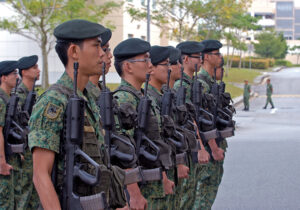
Trans women who are forced to go through NS often report incidents of verbal harassment and physical assault. Lune Loh, speaking with The Associated Press in November 2022, detailed one incident where a man “took his rifle and tried to shove it between her legs.”
“I feel like the earth will cook us alive faster than we can get legal gender recognition,” Loh told the news service.
As a consequence of these shifts in policies and social infrastructure, mental health in the trans community has diminished in recent years. Menon says that although LGBTQ+ rights and issues were not publicly talked about during his time, “it still felt safer than it is right now.”
He cites the lack of available information about gender-affirming health care and the growing omnipresence of social media in Singaporean society as possible reasons for this. “There was no gender clinic back then, but we all knew who to go to. So psychologically, it doesn’t affect you that much,” Menon says. “But right now, there’s no clarity.”
A trans person who is of legal age in Singapore might have to wait years before starting HRT. They might get redirected to clinic after clinic, seeing the same psychologists over and over again.
“All of that takes a toll because all you want to do is [start HRT] and you know that is the solution,” Menon explains. “You know that will make you feel better but you cannot access it.”
Vitriol against the global trans community on social media contributes to this mental toll, he says. “There’s a lot of fear in living their lives because of the violence they have seen online.” Many of his patients report experiencing secondary trauma from the things they have witnessed happening to others like them.
According to a 2021 study by the Williams Institute at the University of California, Los Angeles (UCLA) School of Law: “Transgender people are over four times more likely than cisgender people to experience violent victimization, including rape, sexual assault, and aggravated or simple assault.”
Menon states that in the trans community in Singapore, “almost everyone knows someone who has died, or has attempted suicide themselves.” He adds what is widely known: “One thing about suicide is that once you know someone who has died of suicide, your risk of suicide increases.”
It is also far more difficult for transgender people to find adequate resources to support their physical and mental health as compared to cisgender people in the country. Until 2014, there were no social services dedicated specifically to addressing the needs of the transgender community.
Ginger Rogers, Dance On Air
June Chua, 50, founded The T Project with her late sister, Alicia, in the attic of an old shophouse. Barely large enough to fit three people, the homeless shelter reflected the sisters’ desire to fill a gap that prevailed in Singapore’s social service sector: the lack of services offered to trans people.
Transgender and non-binary youth are more likely to experience homelessness in comparison to cisgender youth. Homelessness can be categorized into two categories: street or unsheltered homelessness and sheltered homelessness. According to the second nationwide homelessness street count published in 2022 by researchers at the National University of Singapore’s Lee Kuan Yew School of Public Policy, the form of homelessness most prevalent in Singapore shifted from street to shelter. Their key findings include that there was a 41% decrease in the number of street homeless people from 1,050 in 2019 to 616 in 2021, but there was a staggering increase in occupancy in temporary shelters, from 65 to 420.
Before 2014, trans individuals experiencing street homelessness would be rerouted to a shelter based on the gender marker listed on that individual’s NRIC, a marker that did not always accurately reflect their gender identity. This not only posed a threat to the homeless trans community but indirectly forced them to weigh the dangers they might face on the streets versus the ones that might follow them into the shelters.
“Can you imagine you’re already female-presenting, and may even have had surgery, and you are forced to share a toilet without doors with six or seven other cisgender males?” Chua asks.
She recalls emailing a social worker about seeking safe, temporary accommodation for trans people experiencing homelessness. Her first email bounced back. She would later receive a response stating that they are not equipped to deal with issues regarding members of the LGBTQ+ community. Chua could not believe what she was reading. “We are LGBTQ+, yes, but we are talking about homelessness,” she wrote back. “Everybody can be homeless.”
The T Project was met with many bureaucratic challenges in its effort to get registered as a nonprofit organization. Normally a business or organization seeking official registration in Singapore can submit their application online and get approval within 24 hours. It took The T Project three years to get approved.
Chua’s application was rejected multiple times due to a clause that prohibited the registration of any organization or entity that would cause “disharmony within society.” In 2019, the Minister of Law came to visit the shelter and explained to Chua that the Singapore government “cannot give money to a particular group” and that if she were to open the shelter to be inclusive of all homeless Singaporeans and not just those in the trans community, he might be able to fund the shelter.
But Chua wasn’t willing to compromise. She had funding from donations, a lease on the shelter and its adjoining buildings, and a complete staff of LGBTQ+ professionals. All she needed was registration. Chua said to him, “Minister, I think I am the first person standing before you not asking for money.”
Three months later, her application was approved.
The T Project and its corresponding counseling service, the Alicia Community Centre, were established by the sisters to directly combat challenges that the trans community in Singapore continues to face, with a specific emphasis on targeting trans youth. (However, Chua has seen people of all ages seeking shelter and counseling, with the oldest being 73 years old.)
Chua’s focus on assisting trans youth stems from her own adolescent experience of coming to terms with her gender identity as well as witnessing those close to her grapple with theirs. She was only twelve years old when a classmate called her bapok, a derogatory Malay term for a trans person.
“During the ‘80s and ‘90s, coming out as gay was so taboo, much less coming out as a transgender woman,” she says. “So at that time if anyone came out as transgender, especially in an Asian country with Asian values, they got chased out by their family.”
Chang Yau Hoon, an Associate Professor at Universiti Brunei Darussalam, attributes the essence of these “Asian values” as being rooted in principles of “[c]onsensus, harmony, unity, and community” in his 2004 journal article for Singapore Management University. This is juxtaposed against “Western values,” which Hoon writes as resembling “absence of consensus, conflict, disunity, and individualism.”
Hoon argues that this concept of “Asian values” has been utilized by Asian countries on the basis of cultural relativism to dismiss “charges of human rights abuses and to justify authoritarian rule.” He further states that Singapore’s founding father “Lee Kuan Yew is convinced that the economic decline of the West was part of a larger crisis of moral values the root cause of which is an obsession with individual rights.”
Chua recalls when her best friend at the time was disowned by her family after coming out as trans when they were both in grade school. “You hear that and you think it was this super dramatic thing where everyone’s crying. But no,” she murmurs. “Her family just locked the gate.”
Both she and her sister were fortunate that their parents did not reduce them to their gender identity. For them, there was nothing that would change the fact that they were a family.
“They chose love,” Chua says. “It was easy.”
At school, Chua went by the name of Ginger. She didn’t recognize it at the time as her preferred name—the phrase was not yet as widespread as its contemporary status—and simply chose the name after a line in her favorite Madonna song. “Ginger Rogers, dance on air,” Chua sings. It didn’t matter that her teachers all agreed that Ginger was a lost cause. At least they were calling her Ginger.
And so Chua became the only girl to attend Bartley Boys Secondary School.
But the world outside of academia did not possess the same tolerance for a self–described “loud and proud” trans woman like Chua, and the only work she found that did not discriminate against people on the basis of their gender identity was in the sex industry. At that time, Chua says, it was almost like a rite of passage for trans women to enter into the sex industry “because that’s the only industry that affirmed us.”
It was the sex workers who employed Chua that told her which doctor and what clinic in Thailand to call in order to undergo gender-affirming surgery. The hospitals in Singapore require extensive psychological, physical, and IQ tests. Even if Chua was approved for the surgery, the months-long process would overlap with her 18th birthday. If the gender listed on her NRIC was still male by then, Chua would be mandated to serve NS.
She placed a long-distance call to the gender clinic in Thailand. When she arrived in person, nobody asked her to complete any additional examinations beyond a routine blood test. Nobody even asked her age. The only question the doctor had for her was: “Did you bring the money?”
Chua looks back at her 20-year-long career in the sex industry with fondness. And although they were some of the best times of her life, Chua has always regarded herself as a “survival sex worker.” Many people assume that the reason behind the custom of trans women becoming sex workers has to do with a longing for acceptance by cis men. “Somehow, if a man wants to have sex with me, then that means I am a woman,” she says mockingly. “I did it to survive.”
Chua worked in the sex industry during the height of the AIDS epidemic and witnessed many of her friends and elderly trans women pass away from contracting HIV.
“I didn’t know how to help them, I was very young,” she says softly. As of now, Chua’s shelter is one of the only shelters in Singapore that does not discriminate against homeless people living with HIV.
A Small Blip
Unlike some LGBTQ+ rights activists in Singapore, Chua describes the “middle ground” the government sought in repealing Section 377A while safeguarding traditional heterosexual marriage as “perfectly logical.”
“For example, Muslims don’t eat pork. We cannot say because Muslims don’t eat pork that we should ban all pork,” she explains. “Singapore is always trying to strike a balance… The government can’t say, ‘This group wants gay marriage so I’m going to legalize gay marriage.’ It doesn’t work like that.”
Others, like Ting, argue that the repeal of Section 377A was merely the beginning of the LGBTQ+ community’s fight for equal rights in Singapore. Ting asserts that there are “so many other things” that they have yet to achieve, and that the repeal was simply “a small blip on [their] radar.”
“Repealing 377A in a sense affects everyone, but maybe it only affects cis gay men,” Ting observes.
Advocates of advancing LGBTQ+ rights in Singapore urge members of the queer community to reckon with its own internal stigma, especially against members with HIV and substance use disorders, as well as to actively combat racial discrimination against marginalized members of the LGBTQ+ community.
The fight for equality may be far from over, but some longtime activists in Singapore are slowing down. “There’s a lot of older activists who get burned out,” Ting says. “You see people who’ve just been penalized so heavily for their activism… It alienates you from finding work if you’re in the newspaper all the time.”
He adds that the widespread attention paid to LGBTQ+ rights movements in Singapore has led to many older activists yearning for a sense of stability in their later life. “There’s not a lot of people like Roy Tan still around.”
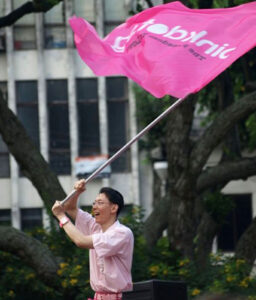
Photo courtesy of Roy Tan.
It is too early to ascertain whether the Singapore government will take further steps advancing LGBTQ+ rights, such as marriage equality, access to gender-affirming health care, or recognition of a new category of anti-queer hate crimes.
The 2022 repeal of Section 377A embodies both progress and the idea that, in order to appease everybody, something always has to give. The delicate balancing act that has governed Singaporean society will prevail so long as there are two ends of the scale and the weight of an entire country distributed evenly at its center
It will be the task of younger generations of LGBTQ+ rights activists to try and tip the scale in their favor, and the responsibility of older generations to pass the torch—and pride flag—along.

